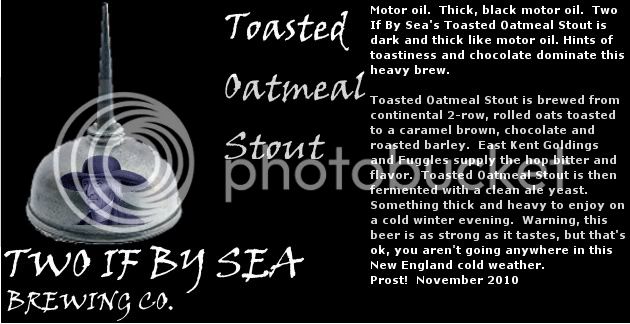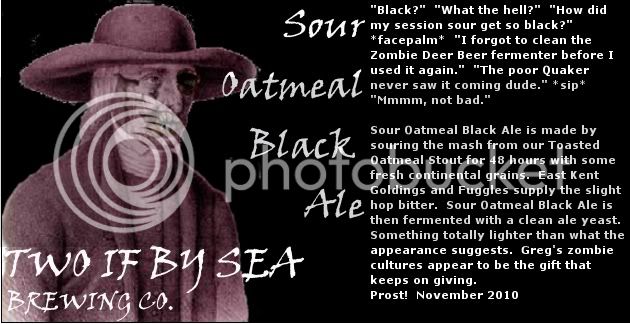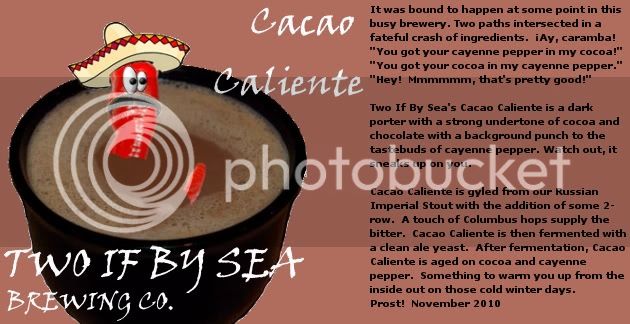You are using an out of date browser. It may not display this or other websites correctly.
You should upgrade or use an alternative browser.
You should upgrade or use an alternative browser.
Yankee Biab
- Thread starter daddymem
- Start date

Help Support Australia & New Zealand Homebrewing Forum:
This site may earn a commission from merchant affiliate
links, including eBay, Amazon, and others.
daddymem
Well-Known Member
- Joined
- 1/3/09
- Messages
- 107
- Reaction score
- 0
Thanks. "Love beer, Love Life
Mate, love the labels. Beer and celebrating life. Beer as a muse... drink to things that matter. Or don't matter as the case may be.
daddymem
Well-Known Member
- Joined
- 1/3/09
- Messages
- 107
- Reaction score
- 0
I wrote up my methods of madness here: http://littlehouseonthesandpit.wordpress.c...ogy-you-choose/ if anyone is interested.
RdeVjun
Well-Known Member
- Joined
- 19/1/09
- Messages
- 2,340
- Reaction score
- 172
Great work! :icon_cheers:I wrote up my methods of madness here: http://littlehouseonthesandpit.wordpress.c...ogy-you-choose/ if anyone is interested.
Q. Can I ask why you add the salt water (i.e. water profile adjustment for those unwilling to read TFA) after the grain? I thought that some salts needed to be dissolved in the water to get the chemistry right beforehand, although I'm aware that some brewers add salts to the boil too (as well as the mash). Just curious and happy to be informed.
daddymem
Well-Known Member
- Joined
- 1/3/09
- Messages
- 107
- Reaction score
- 0
Hadn't really thought of it but it is almost at the same time. The grains go in and the salts are in within a minute or so. I could add the Chloride/sulfate ratio salts to the boil and not the mash, I just happen to add them all in at once. Water building is not one of my strengths, I can use any and all advice. Essentially, what I think I know is that can adjust your water for the mash using the SRM and corresponding desireable Residual Alkalinity, and do an adjustment in the boil kettle for Chloride/Sulfate ratio for the bitterness/maltiness of the beer you are brewing. My water is very void of minerals so I tend to adjust when doing beers on the dark side.
Great work! :icon_cheers:
Q. Can I ask why you add the salt water (i.e. water profile adjustment for those unwilling to read TFA) after the grain? I thought that some salts needed to be dissolved in the water to get the chemistry right beforehand, although I'm aware that some brewers add salts to the boil too (as well as the mash). Just curious and happy to be informed.
daddymem
Well-Known Member
- Joined
- 1/3/09
- Messages
- 107
- Reaction score
- 0
Just listened to a podcast by Palmer and Jamil and I guess I was doing it right after all. The salts are easier to dissolve into the mash because the pH will drop once the grains are in. But there is the ability to do mash and boil additions. The salts needed for the mash have to do with the residual alkalinity. The salts for flavor can be added into the boil.(chloride/sulfate ratio).
RdeVjun
Well-Known Member
- Joined
- 19/1/09
- Messages
- 2,340
- Reaction score
- 172
Good work! Makes sense too.
I've been adding my salts to a small amount of strike water with a pinch of citric acid to dissolve them- things like Gypsum are reluctant to dissolve. I don't add 5.2 to that though, seems to precipitate other complexes out so it goes into the kettle.
Thanks for that, :icon_cheers:
I've been adding my salts to a small amount of strike water with a pinch of citric acid to dissolve them- things like Gypsum are reluctant to dissolve. I don't add 5.2 to that though, seems to precipitate other complexes out so it goes into the kettle.
Thanks for that, :icon_cheers:
Why would you add 5.2 to the boil?Good work! Makes sense too.
I've been adding my salts to a small amount of strike water with a pinch of citric acid to dissolve them- things like Gypsum are reluctant to dissolve. I don't add 5.2 to that though, seems to precipitate other complexes out so it goes into the kettle.
Thanks for that, :icon_cheers:
It is designed for the mash and to keep the mash pH at the optimal for conversion.
Gypsum will desolve just fine in water. Chalk is what does not disolve in water.
RdeVjun
Well-Known Member
- Joined
- 19/1/09
- Messages
- 2,340
- Reaction score
- 172
Actually I don't, it goes into the BIAB kettle with the strike water and before the grist. It would be pointless adding 5.2 to the boil, as you're obviously aware.Why would you add 5.2 to the boil?
It is designed for the mash and to keep the mash pH at the optimal for conversion.
That just hasn't been my experience I'm afraid, the gypsum I'm using seems reluctant to dissolve in rainwater, but a mildly acidic, warm solution seems to help.Gypsum will desolve just fine in water. Chalk is what does not disolve in water.
daddymem
Well-Known Member
- Joined
- 1/3/09
- Messages
- 107
- Reaction score
- 0
What is the consensus on this side of the pond? I hit a hornet's nest on my side in a forum. Seems there is disagreement on how SRM and residual alkalinity are linked. It seems the new idea is to add 1 tsp Calcium Chloride per 5 gallons, adjust your chloride sulfate ratio if needed, take a pH reading and have some acid ready to drop the pH down.
What is the consensus on this side of the pond? I hit a hornet's nest on my side in a forum. Seems there is disagreement on how SRM and residual alkalinity are linked. It seems the new idea is to add 1 tsp Calcium Chloride per 5 gallons, adjust your chloride sulfate ratio if needed, take a pH reading and have some acid ready to drop the pH down.
I can guess what forum blasted you for trying to use science in brewing. The reason why I gave up on them.
I think they are half-correct. Color of the wort and residual alkalinity is linked. The problem comes in with how much color and the grain bill and even mash thickness. Here is a site that you can read about it. http://braukaiser.com/wiki/index.php?title...tanding_Mash_pH
This is one case where Palmer has a great contribution and it can go wrong because it is over simplified. That said I use his excel spreadsheet to do my calculations. I have found they do not work on wheat beers as I have found wheat beers tend to be more acid then they should be by color only.
So why did you get a big stink over color and residual alkalinity on those forums? Most likely because the people that did it are not forum friendly. They may have had a bad experience with the concept. It could be they made mistakes in the input or the water was not as expected or they are just jerks.
I can say that after I started to treat and pH test my mash water my beers have been better. Playing with bitterness ratios has helped with the flavor. I may even look at doing boil additions if I have trouble balancing the pH correction and flavor enhancement. So far I have not had that much trouble. It would make it easier.
Blanket water treatment as you suggested others are doing is a real bad idea. Not everyones water is the same and in areas where they switch from surface to wells at the change of the seasons the water can change drastically.
daddymem
Well-Known Member
- Joined
- 1/3/09
- Messages
- 107
- Reaction score
- 0
I reworked the numbers and then bounced them off Mr. Palmer and revised slightly again. Still a few questions.
In the spreadsheet I use it has a chloride sulfate ratio section with:
Below .50, Style = Very Bitter .50 to .77, Style = Bitter .77 to 1.3, Style = Balanced 1.3 to 2.0, Style = Malty Above 2.0, Style = Very Malty How would one determine where your beer sat in these ranges? I mean an altbier in malty to very malty is probably ok and an IPA in bitter or verry bitter the same. My RIS is currently 77 IBU with a BU GU just around 1. Where would that sit?
I'm still fiddling with the recipe as far as hops. 77 is the current IBU. With a 5 year age, should I go higher? How high?
I'm also thinking about adjusting my boil time. I lose 1 gallon per half hour so a 90 minute boil will give me a little more water for a thinner mash. Sound like a good idea?
5.25 final batch
.05 gal/# absorption = 1.15
2 gal/hr boil off x 90 minutes = 3
Total = 9.4 gallons
Say7.5 mash and 2 sparge.
Starting Water (ppm):
Ca: 2
Mg: 1.1
Na: 6.5
Cl: 8.4
SO4: 4.1
HCO3: 11
Mash / Sparge Vol (gal): 7.5 / 2 RO or distilled %: 0% / 0%
Total Grain (lb): 23
Non-Roasted Spec. Grain: 0.5
Roasted Grain: 3.5
Beer Color (SRM): 54
Adjustments (grams) Mash / Boil Kettle:
CaSO4: 6 / 0 CaCl2: 4 / 0 MgSO4: 3 / 0 NaHCO3: 10 / 0 NaCl: 0 / 0 CaCO3: 0 / 0 Lactic Acid (ml): 0
Sauermalz (oz): 0
Mash Water / Total water (ppm):
Ca: 88 / 70 Mg: 11 / 9 Na: 103 / 83 Cl: 76 / 62 SO4: 163 / 130 Cl to SO4 Ratio: 0.47 / 0.48
Alkalinity (CaCO3): 220
RA: 151
Estimated pH: 5.17
Note: it is CaCO3 not HCO3, there is a label error in the spreadsheet and for some reason, my Firefox HATES this forum's reply box and won't let me edit things after I type them. Must be a Yankee filter or something.
In the spreadsheet I use it has a chloride sulfate ratio section with:
Below .50, Style = Very Bitter .50 to .77, Style = Bitter .77 to 1.3, Style = Balanced 1.3 to 2.0, Style = Malty Above 2.0, Style = Very Malty How would one determine where your beer sat in these ranges? I mean an altbier in malty to very malty is probably ok and an IPA in bitter or verry bitter the same. My RIS is currently 77 IBU with a BU GU just around 1. Where would that sit?
I'm still fiddling with the recipe as far as hops. 77 is the current IBU. With a 5 year age, should I go higher? How high?
I'm also thinking about adjusting my boil time. I lose 1 gallon per half hour so a 90 minute boil will give me a little more water for a thinner mash. Sound like a good idea?
5.25 final batch
.05 gal/# absorption = 1.15
2 gal/hr boil off x 90 minutes = 3
Total = 9.4 gallons
Say7.5 mash and 2 sparge.
Starting Water (ppm):
Ca: 2
Mg: 1.1
Na: 6.5
Cl: 8.4
SO4: 4.1
HCO3: 11
Mash / Sparge Vol (gal): 7.5 / 2 RO or distilled %: 0% / 0%
Total Grain (lb): 23
Non-Roasted Spec. Grain: 0.5
Roasted Grain: 3.5
Beer Color (SRM): 54
Adjustments (grams) Mash / Boil Kettle:
CaSO4: 6 / 0 CaCl2: 4 / 0 MgSO4: 3 / 0 NaHCO3: 10 / 0 NaCl: 0 / 0 CaCO3: 0 / 0 Lactic Acid (ml): 0
Sauermalz (oz): 0
Mash Water / Total water (ppm):
Ca: 88 / 70 Mg: 11 / 9 Na: 103 / 83 Cl: 76 / 62 SO4: 163 / 130 Cl to SO4 Ratio: 0.47 / 0.48
Alkalinity (CaCO3): 220
RA: 151
Estimated pH: 5.17
Note: it is CaCO3 not HCO3, there is a label error in the spreadsheet and for some reason, my Firefox HATES this forum's reply box and won't let me edit things after I type them. Must be a Yankee filter or something.
Is it me or does the NA seem high. You can change to Calcium Carbonate as long as you add it in the mash. If you put it in the strike water it will settle unless you stir well just before you add the grain. It will also help raise the calcium level for you. I like to be over 100.
daddymem
Well-Known Member
- Joined
- 1/3/09
- Messages
- 107
- Reaction score
- 0
Is it me or does the NA seem high. You can change to Calcium Carbonate as long as you add it in the mash. If you put it in the strike water it will settle unless you stir well just before you add the grain. It will also help raise the calcium level for you. I like to be over 100.
I could adjust that. This is actually adjusted down a bit per Palmer's recommendation. I was avoiding chalk as this salt seems to be the one with the most disagreement on how much and what effect it really has. Having said that, a couple grams shouldn't be an issue. Sometimes the noggin gets stuck in the gopher hole and I need to peer up to see where I am. Thanks!
I could adjust that. This is actually adjusted down a bit per Palmer's recommendation. I was avoiding chalk as this salt seems to be the one with the most disagreement on how much and what effect it really has. Having said that, a couple grams shouldn't be an issue. Sometimes the noggin gets stuck in the gopher hole and I need to peer up to see where I am. Thanks!
If you are worried about using it, I think Braukaiser has a discussion on pre dissolving and it gets converted from carbonate to bicarbonate as I recall. Not sure where that is. It may be in the spreadsheet.
Similar threads
- Replies
- 0
- Views
- 2K
- Replies
- 8
- Views
- 3K
- Replies
- 8
- Views
- 2K
- Replies
- 15
- Views
- 6K











